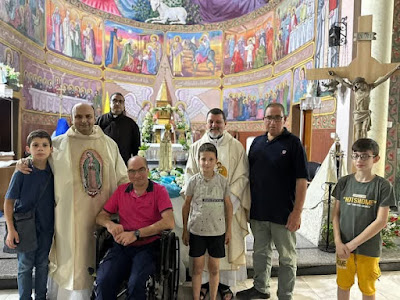 |
| Catholic Church in Gaza, with Nasser's brother and family \ |
Thursday, July 17, 2025
Friday, June 27, 2025
Monday, June 23, 2025
POEM: "I Want to Know"
If regime change in Iraq was good for Iraq,
If shock and awe was good for children, parents, anyone at all,
If it turned out well for American boys and girls
Soon summoned to patrol land-mined cities on foot,
And then bringing home to these shores such pain,
Such wounding, and grievances we all carry now,
Like burned-out tires around our American necks?
I want to know
If lying, flat-out lying, about weapons of mass destruction
Did any good at all for toddlers in the States,
Or teachers in Baghdad, Bethlehem, Damascus, Tel Aviv,
Or if Abu Grahib -- shame on us --
Impressed the whole wide world with
Visions of decency and democracy, a world made well?
I want to know
If the New York Times' celebration of B2 firepower
(How glorious, our weapons! How successful, our planes!
How well deserved, this destruction!)
Is something like those early days in Iraq,
How easy it all seemed, to bomb and destroy,
To take over cities and depose tyrants,
To terrorize a people, and then an entire region?
----
I want to know
If the child wailing for the father
His mother has just buried in Gaza,
For cousins incinerated at food stations in Gaza,
For a future that looks like rubble in Gaza,
If he's safer now, if he's a global citizen now,
If he'll ever sing a song or play a silly game?
I want to know
Who makes money on these things,
On the lies that are told to set such violence in motion,
On the destruction of proud cities, and the rage of whole peoples,
And the deaths of thousands, thousands, thousands?
Saturday, June 21, 2025
DISOBEDIENCE: "Getting Clear and Courageous Now"
Saturday Night / As Trump Decides
If you're my age, you probably remember 2002 and 2003, the fog of 9/11, the maddening lies out of the Bush Administration, the rush to conquest in Iraq. Like me, you were probably out in the streets, saying "No War in Iraq!"
We knew, back then, that "shock and awe" was dumb and dumber...and yet violence has a way of bringing us together, uniting a frazzled and frenzied public, and improving the political fortunes of its masters. Sad and deadly, but true.
In a sense, Benjamin Netanyahu takes pages out of that same playbook now--pulverizing Gaza and slaughtering tens of thousands there and, when that well runs dry, when Israeli society tires of his carnage, turning toward Iran again. As Yoav Haifawi says in Haaretz this weekend:
But suddenly, when Israel initiated the expansion of the war into an all-out attack on Iran, which will inevitably bring further death and destruction in both Iran and Israel, we began to see again the power of violence to take over the human psyche and paralyze thought. Suddenly, the automatic Israeli consensus stiffened again, with the media and the public celebrating the spilled Iranian blood. Even a sinking Europe, which had begun to show remorse in its support of the genocide in Gaza, became enthusiastic again, with Germany, France, and Britain literally begging for their share of the pound of flesh and blood.And here we are, twenty three years later, and we're making the very same bloody mistake. And don't be fooled; we're already complicit. Whether or not Trump sends those B-2s to do Bibi's dirty work in the darkness. American Presidents--including Democrats like Biden and Republicans like Trump--have refused to confront, deter, call out or de-fund the Israeli war machine. American Presidents have refused to hold Israel (and our own government!) accountable to international law and human rights conventions. And for this cowardice, bombs are flying over Haifa tonight, and landing in Tel Aviv, and hitting hospitals in the South; and many more are hitting neighborhoods in Iran, and traumatizing new generations of Middle Easterners--who will not soon forget. And hungry children are being shot in food lines in Gaza.
Protests are fine. Our voices should be loud. But that didn't work in 2003. And we will have to do more, to be bolder, to be smarter, this time.
Candidates that take money from big money lobbies like AIPAC or the weapons industry should be voted down and voted out--Democrats and Republicans. Companies still profitting in any way from Israel's apartheid system of racist control and illegal settlements in the West Bank should be boycotted. That means you, Chevron.Investment accounts at universities, churches, synagogues and the rest should be purged of any holdings in companies that champion the architecture of apartheid and ethnic cleansing. We should show up and support college students doing the hard work in their campuses. Divestment is not as hard as it seems. See the American Friends Service Committee, for help! And every church, synagogue and mosque in the country should join the Apartheid-Free Movement within the next two months. Move the needle. Show resolve. Stand up and be counted.
Again, it's not terribly complicated. But it does take courage and purpose. In 1922, a century ago, Gandhi said: "Disobedience without civility, discipline, discrimination, non-violence, is certain destruction. Disobedience combined with love is the living water of life.”
It is time, my friends, for disobedience. Not tomorrow. Not next fall. It is time for disobedience. See the links if you need them. And BE THE LIVING WATER OF LIFE.
IMAGINATION: "Paths to a Just Peace"
Friday, June 20, 2025
PRAYER: "Prophets of a Future Not Our Own"
 |
| Crew of the Madleen, June 2025 |
The Kingdom is not only beyond our efforts; it is even beyond our vision.
We accomplish in our lifetime only a fraction of the magnificent enterprise that is God’s work.
Nothing we do is complete, which is another way of saying that the kingdom always lies beyond us.
No statement says all that could be said. No prayer fully expresses our faith. No confession brings perfection. No pastoral visit brings wholeness. No program accomplishes the church’s mission. No set of goals and objectives includes everything.
This is what we are about.
We plant the seeds that one day will grow. We water the seeds already planted, knowing that they hold future promise. We lay foundations that will need further development. We provide yeast that produces effects far beyond our capabilities.
We cannot do everything and there is a sense of liberation in realizing that. This enables us to do something and to do it well. It may be incomplete, but it is a beginning, a step along the way, an opportunity for the Lord’s grace to enter and do the rest. We may never see the end results, but that is the difference between the master builder and the worker.
We are workers, not master builders; ministers, not messiahs.
We are prophets of a future not our own.
------------------------------------------------------
This prayer was composed by the late Bishop Ken Untener of Saginaw, drafted for a homily by Cardinal John Dearden in November 1979 for a celebration of departed priests. As a reflection on the anniversary of the martyrdom of Bishop Romero, Bishop Untener included in a reflection book a passage titled "The mystery of the Romero Prayer." The mystery is that the words of the prayer are commonly attributed to Oscar Romero, but they were never spoken by him. Pope Francis used the “magnificent” prayer in December 2015 in his Christmas address to the Roman Curia.
The confusion seems to have arisen from a major paper on Catholic education given by Westminster’s Cardinal Basil Hume on 6 January 1997 where he quoted the prayer but, for reasons it is now impossible to fathom, misattributed it to Archbishop Romero. His paper was subsequently published in a the ‘Briefing’ documentary service on 20 February 1997. The prayer was then picked up by Caritas Internationalis in Rome and CAFOD in London – both of whom included it (together with the misattribution to Archbishop Romero) in materials being used for their strategic planning processes in the run-up to the Millennium Jubilee. Thereafter the beautiful prayer went around the global Church and, not surprisingly, it became known as ‘The Romero Prayer’.





